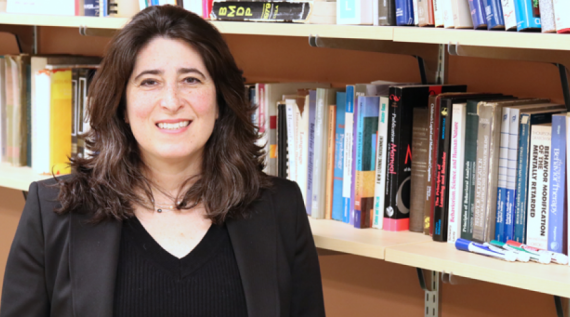Sibling support initiative to aid families at Worcester Recovery Center
 Having a brother or sister with a serious mental illness is stressful for other siblings in the family. Now an innovative support program is available for families of youth and young adults hospitalized in the inpatient adolescent psychiatry units at the Worcester Recovery Center and Hospital.
Having a brother or sister with a serious mental illness is stressful for other siblings in the family. Now an innovative support program is available for families of youth and young adults hospitalized in the inpatient adolescent psychiatry units at the Worcester Recovery Center and Hospital.
“Our sibling support program strives to decrease trauma and build resiliency among family members of psychiatrically hospitalized patients,” said Emily Rubin, MA, founder and director of the program at the Eunice Kennedy Shriver Center at UMass Medical School and assistant professor of psychiatry. “It further builds capacity among providers who practice family-centered mental health care.”
Since the program’s inception seven years ago at Boston-area hospitals, more than 2,000 family members have participated. In structured activities led by trained staff, siblings learn about the hospitalized child’s illness, learn to develop coping skills and get to bond with peers who have had similar experiences. In groups led by parent mentors, adult caregivers learn strategies to support children and get guidance, and become connected to community resources.
“The Sibling Support Program is unique in our use of parent mentors—every family that has a child admitted to one of our acute care participating hospitals gets a call from one of our trained parent mentors,” said Rubin. “For many families, it is the first time another parent with lived experience has reached out to them during a crisis.”
New at the Worcester Recovery Center, the program will allow Rubin and colleagues to work over an extended period with its staff parent mentor and families whose children are hospitalized for long-term psychiatric care. The expansion builds on the established programs at Cambridge Health Alliance and Franciscan Children’s, where short-term hospitalizations permit just a single session.
Rubin’s interest in the impact of a child’s mental illness on the entire family began as she grew up with an older sister with special health care needs. A professional writer and educator interested in trauma and resiliency, she began to research and develop a sibling support curriculum in 2009 with funding from a Barbara Wilensky Gopen Memorial Fellowship. During her project, she met faculty of the Shriver Center, which is one of the fellowship sponsors, while working on the project and was later invited to join the center.
Rubin is co-founder and president of the Massachusetts Sibling Support Network. The organization is a state chapter of the national Sibling Leadership Network and collaborates with key stakeholders in the disability field including the Shriver Center, the Massachusetts Developmental Disabilities Council, the Institute for Community Inclusion, the Arc of Massachusetts and the Federation for Children with Special Needs.
Rubin and Shriver colleagues are conducting and publishing research to determine the program’s extended impact on siblings and families, and on providers who are trained to support them. A study soon to be published in the journal Adolescent Psychiatry found that participants were highly satisfied with their experiences. Parents and siblings alike found validation and support through learning and sharing their experiences in a group setting.
“We’re excited to be expanding in Worcester with a great partnership with great potential,” said Rubin. “It is a win-win for families, patients and providers, with every aspect of the family dynamic accounted for.”
Rubin is also writing a treatment manual to guide agencies and institutions providing psychiatric treatment on how to implement the program in order to extend its reach and availability.
